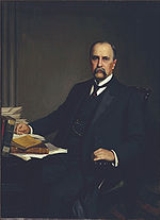
. He was one of the "Big Four" founding professors at Johns Hopkins Hospital
as the first Professor of Medicine and founder of the Medical Service there. (The "Big Four" were William Osler, Professor of Medicine; William Stewart Halsted
, Professor of Surgery; Howard A. Kelly, Professor of Gynecology; and William H. Welch
, Professor of Pathology.) Osler created the first residency program for specialty training of physicians, and he was the first to bring medical students out of the lecture hall for bedside clinical training.
He has been called the "Father of modern medicine
." Osler was a pathologist, physician, educator, bibliophile, historian, author, and renowned practical joker.
William's great grandfather, Edward Osler, was variously described as either a merchant seaman or a pirate, and one of William's uncles (Edward Osler 1798-1863), a medical officer in the Navy, wrote the Life of Lord Exmouth and the poem The Voyage. William Osler's father, Featherstone Lake Osler (1805–1895), the son of a shipowner at Falmouth, Cornwall
, was a former Lieutenant in the Royal Navy and served on .
Common sense in matters medical is rare, and is usually in inverse ratio to the degree of education.![]()
The trained nurse has become one of the great blessings of humanity, taking a place beside the physician and the priest, and not inferior to either in her mission.![]()
When schemes are laid in advance, it is surprising how often the circumstances fit in with them.![]()
We can only instill principles, put the student in the right path, give him method, teach him how to study, and early to discern between essentials and non-essentials.![]()
To study the phenomenon of disease without books is to sail an uncharted sea, while to study books without patients is not to go to sea at all.![]()
No human being is constituted to know the truth, the whole truth, and nothing but the truth; and even the best of men must be content with fragments, with partial glimpses, never the full fruition.![]()
Acquire the art of detachment, the virtue of method, and the quality of thoroughness, but above all the grace of humility.![]()
Medicine is a science of uncertainty and an art of probability. ![]()
The best preparation for tomorrow is to do today's work superbly well.![]()

